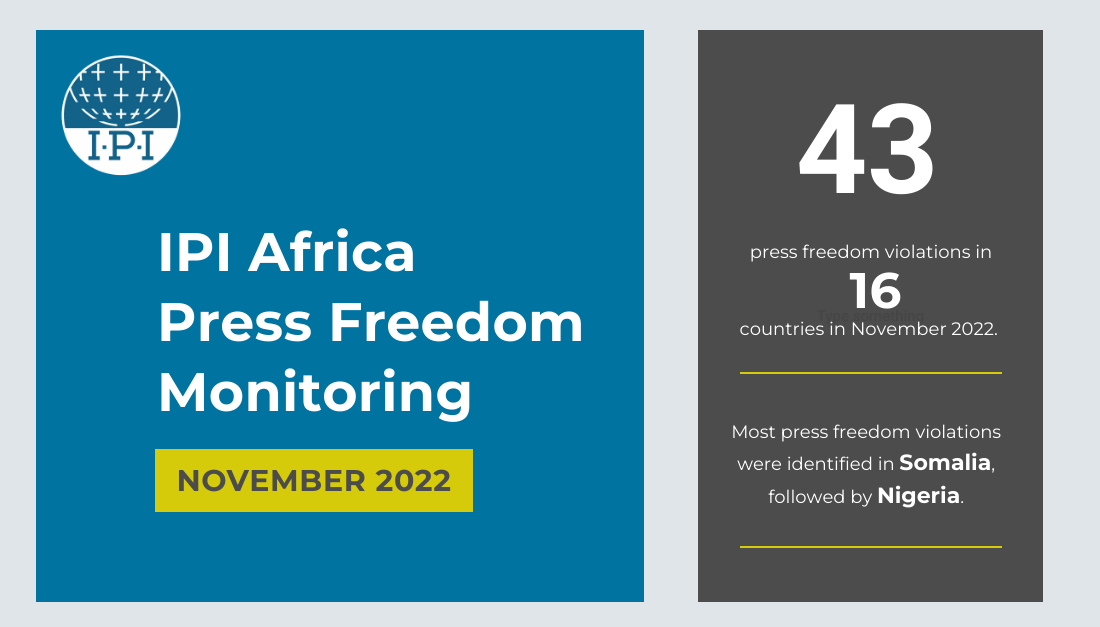Journalists and media outlets in Somalia, Nigeria, Zimbabwe, and the Democratic Republic of Congo, Nigeria faced continued attacks, censorship, and pressure in November 2022, according to IPI monitoring of press freedom violations in Africa.
In total, 43 press freedom threats or violations were identified in November across 16 countries in sub-Saharan Africa, with 30 of these incidents involving male journalists and 7 involving female journalists. According to IPI data, state actors — such as state security agents or police — were involved in a vast majority of these incidents.
The highest number of identified press freedom threats and violations (12) occurred in Somalia, where independent journalists and civil society have come under increasing attack amid escalating violence and deteriorating security conditions due to ongoing clashes between government forces and the Islamist armed group Al-Shabab. The government’s harassment of the Somali Journalist Syndicate (SJS) continued in November, as the National Intelligence and Security Agency (NISA) arrested and detained three SJS staff members at the airport in Mogadishu. SJS Secretary General Abdalle Ahmed Mumin also continued to fight criminal charges after being arrested twice in October. Mumin was arrested after SJS issued a statement condemning a government directive prohibiting the ”dissemination of extremism ideology messages” by traditional and social media as detrimental to press freedom.
In Nigeria, pressure on journalists and media outlets intensified as the country headed into the 2023 general election. IPI documented numerous cases of physical assaults on journalists, including by party officials while covering campaign events and or by elected officials. In addition, Nigeria’s broadcast regulator fined private TV channel, Arise TV, for airing “fake news” after a senator, who was a presidential candidate of the All Progressive Party in the 2023 election, lodged a complaint against the station.
In Zimbabwe, restrictions on independent media and critical journalists continued. Journalist Leopold Munhende, with the online newspaper New Zimbabwe, was handed criminal charges for publishing “false news” for an article he published about a protest against Zimbabwe’s president Emmerson Mnangagwa at the JFK airport in New York in September. In addition, two journalists working for the independent daily newspaper Newsday were barred from covering President Emmerson Mnangagwa’s State of Nation Address.
In the DRC, journalists faced censorship and arrest, according to IPI data. In the DRC, authorities expelled Reuters journalist Sonia Rolley, from the country for reasons believed to be connected to her previous media coverage. In addition, at least three journalists were arrested, including James Mushing, a reporter with Kinshasa-based ACTU 30 TV, a privately owned channel who was arrested and detained at a military barrack after interviewing activists of the opposition political party.
Download the November factsheet here
IPI monitors and collects data on press freedom violations in Africa using a standardized methodology that categorizes violations across the following main categories: physical, verbal or online attacks; arrests and charges against journalists; surveillance of journalists; cases of censorship; laws and regulations that restrict the press freedom; and restriction on access to information. Data are further disaggregated by gender. Our monitoring and data collection activities are part of IPI’s wider Africa programme, which aims to defend press freedom and the safety of journalists in sub-Saharan Africa.
